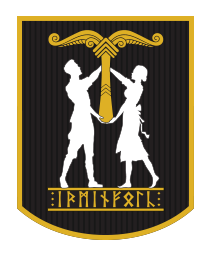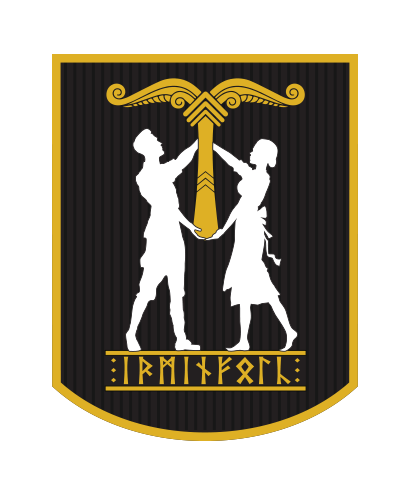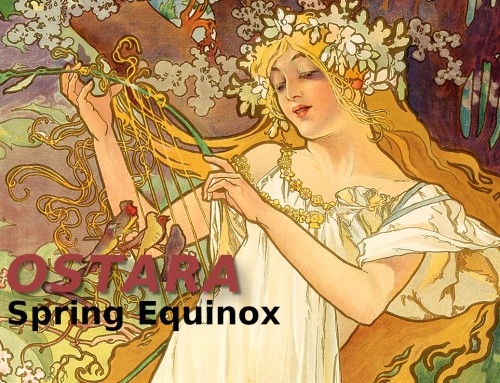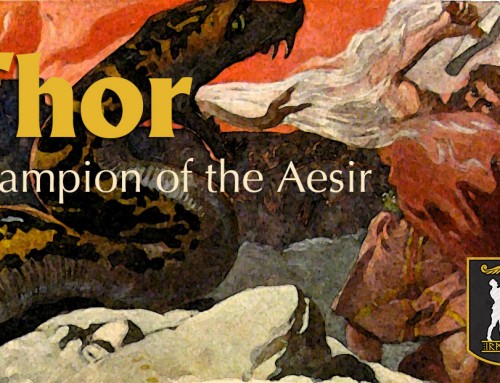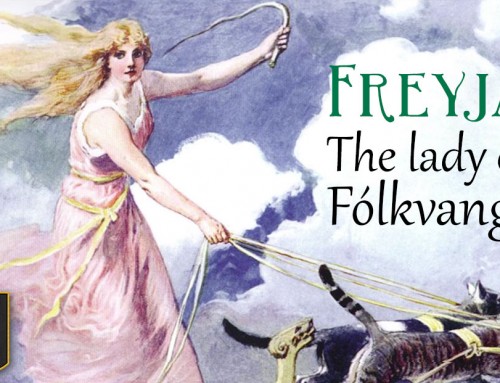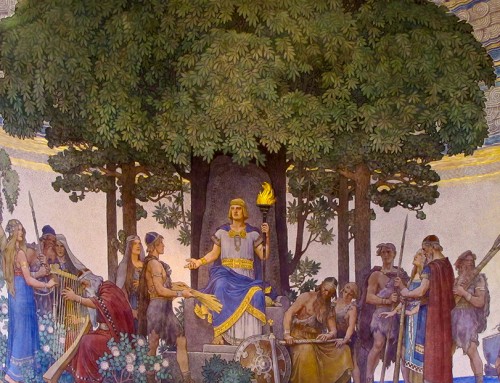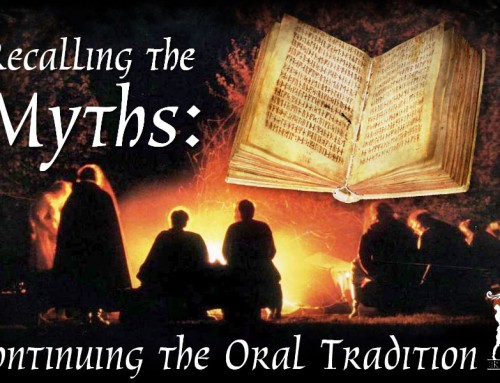By: Luther Kovac
“The Norns bestow good fortunes and other noble gifts, but frequently also calamities. Their decrees are invariably irrevocable: ‘No one can withstand the word of Urdhr, even though it be spoken to one’s destruction.’ They furthermore accompany man through all the vicissitudes of life. They assist women at childbirth, keep watch over the new-born child, and weave its destiny.”
– The Religion of the Teutons, By Pierre Daniël Chantepie de la Saussaye p314
Is our fate predetermined? Do we have free will or does it just seem that way? There are no simple answers, and moreover, what do the questions mean? Fate, as a concept, has meant different things to different people. Our ancestors had their own way of looking at the past, present and future. They called it Wyrd.
The Odinist concept of Wyrd roughly corresponds to “fate” or “destiny,” and like many things originating from the Old Religion, it shares similarities with current ideas but does not have a definitive modern equivalent. Wyrd is as much about the past as the future. To better comprehend Wyrd we need an understanding of the world-view of our ancestors, and the origin of the word itself.
The modern term “weird” is derived from Wyrd, and has come to mean “strange.” Unfortunate but fitting, since the old ways have come to be strange to modern people. This usage is thought to originate from Middle English as a result of Shakespeare’s play Macbeth, in which the Norns were referred to by one of their other names, the Weird Sisters, and were portrayed as frightening or odd-looking. Wyrd itself is derived from the much older, Proto-Indo-European term Wert which means “to turn.” The following description is from the Online Etymology Dictionary:
“weird: Old English wyrd (n.) “fate, destiny,” literally “that which comes,” from Proto-Germanic *wurthis (cf. Old Saxon wurd, Old High German “fate,” Old Norse urðr “fate, one of the three Norns”), from PIE *wert– “to turn, wind,” (cf. German werden, Old English weorðan “to become”), from root *wer– (3) “to turn, bend” (see versus). For sense development from “turning” to “becoming,” cf. phrase turn into “become.” – Online Etymology Dictionary (http://www.etymonline.com)
Wyrd is a variation of the name Urdhr, the eldest of the Nornir (Norns), the three goddesses of fate; who are considered by some to be the goddesses of death because they decree when both gods and men alike will die. The Norns (Urdhr, Verdhandi, and Skuld) were sometimes called the Weird Sisters long before Macbeth was written. So Wyrd is both the name of a goddess, and also describes what she creates when she weaves the threads of fate.
“Linguistically, the words urdhr (ON) and English wyrd (weird) are identical (the loss of the initial w is the result of the same regular rule that turns Wõdhanaz into Òdhinn).” Runelore: The Magic, History, and Hidden Codes of the Runes by Edred Thorsson (1987) p126
Each of the three Norns were roughly associated with an aspect of the flow of time: Urdhr (Urd, Urðr, Urth, Urdar, Wyrd) the past, Verdhandi the present, and Skuld the future. Yet Urdhr seemed to be the most powerful and influential in regard to fate, which is logical since the past is the foundation on which the future is built. They dwell beneath and care for Yggdrasil, the tree of life, sprinkling it with water from the nearby well of Urdhr (the Well of Wyrd). They were not subject to the rule of the other gods, who had no influence over their decrees. As they weave the threads of destiny, they are always making adjustments, a single thread affects the others and in return it is also changed. Our Wyrd is determined not only by our own actions but affected by the actions of others, and many other variables that are inevitably out of our control.
“19. An ash I know, | Yggdrasil its name,
With water white | is the great tree wet;
Thence come the dews | that fall in the dales,
Green by Urth’s well | does it ever grow.
20. Thence come the maidens | mighty in wisdom,
Three from the dwelling | down ‘neath the tree;
Urth is one named, | Verthandi the next,–
On the wood they scored,– | and Skuld the third.
Laws they made there, and life allotted
To the sons of men, and set their fates.”
–Poetic Edda, VOLUSPA 19,20 (Bellows translation)
The three sisters are described as goddesses, but sometimes as giant kin, and are said to have a different origin than the gods. Besides the three principle Norns, there were many others, of much less importance. They seem to take the form of guardian spirits, and were usually present at events such as marriages, births, and deaths. They were thought to give gifts to their favorites. Also the Valkyrs, the choosers of the slain, were sometimes called Norns or wish maidens, and were at times led to battle by the goddess Freya or Skuld.
The three principal Norns are similar, but not identical to the Greek Fates. The biggest difference being the nature of predestination. The Norse/Teutonic people did not believe that destiny was linear; instead, they believed in potential possibilities that were determined by variables in the past and present. Different actions would result in different future potentials, but the past and present determined which choices, if any, were available; and under most circumstances someone’s personal perspective and social situation led to which choice they would make. So while the future holds different possibilities, it tends to flow in a predetermined pattern. They also believed that the nature of the universe was cyclic, that in many cases the past has already determined what will be.
“The Norns sometimes wove such large webs that one of the weavers stood on a high mountain in the extreme east, while another waded far out into the western sea. The threads of their woof resembled cords, and varied greatly in hue, according to the nature of the events about to occur, and a black thread, tending from north to south, was invariably, considered an omen of death. As these sisters flashed the shuttle to and fro, they chanted a solemn song. They seemed not to weave according to their own wishes, but blindly, as if reluctantly executing the wishes of Orlog, the eternal law of the universe, an older and superior power, who apparently had neither beginning nor end.
Two of the Norns, Urd and Verdandi, seemed very beneficent indeed, while the third relentlessly undid their work, and often, when it was nearly finished, tore it angrily to shreds, scattering the remnants to the winds of heaven. As personifications of time, the Norns were represented as sisters of different ages and characters, Urd (Wurd, weird) appearing very old and decrepit, continually looking backward, as if absorbed in contemplating past events and people; Verdandi, the second sister, young, active, and fearless, looked straight before her, while Skuld, the type of the future, was generally represented as closely veiled, with head turned in the opposite direction from that where Urd was gazing, and holding a book or scroll which had not yet been opened or unrolled.” – Myths of Northern Lands by H.A. Guerber (Published 1895) p155
Wyrd is similar to the term Orlog (Old Norse: fate), and some people use them interchangeably, but they have also been used to describe different aspects of fate. As the quote by Guerber suggests, Orlog is basically the way things work and interact. It includes physics, cause and effect, probability ratios and even the strange behavior of matter at the quantum level. Wyrd is the progression of events based on the laws of Orlog. If Wyrd is a possible path (future potential), then Orlog is the reason that particular path exists, and others do not. Within the Elder Futhark Orlog is symbolized by the Pertho rune.
“This is the most guarded of the runes. It is the cultic symbol of the secret of Ørlög – the mystery of wyrd. This is the power of the Nornir and one that complements the force of consciousness present in the Æsir. The runester must learn to investigate the way of wyrd that he may understand it and, when need be, overcome it. (This is the great Òdhinic accomplishment at Ragnarök.)” Runelore: The Magic, History, and Hidden Codes of the Runes by Edred Thorsson (1987) p125
How can one overcome fate? According to the Poetic Edda one cannot. However, the Norns are constantly reweaving the threads of Wyrd, so there can be more than one potential fate and, as Thorsson’s quote conveys, understanding Wyrd can help which fate “becomes.” Without this understanding, our actions will likely be determined by emotional responses or social expectations, and the result will be highly predictable. What is not clear in the quote is how challenging overcoming this can be; but, although it is difficult, it is not impossible.
A good place to study how Wyrd influences our actions and destiny can be found in epic poem Beowulf. The classic text was almost certainly written by Christians, but was also written in the ancient poetic tradition of the Norse/Teutonic people and contains much of the worldview held by our Pagan ancestors. Beowulf has been used as a reference for the concept of Wyrd by several experts for over a century. Wyrd can be said to be the background theme for the entire poem. I particularly liked King Hrothgar’s tale of Finn’s treachery in chapters 16 and 17 (Raffel translation) which described, in retrospect, a chain of events that inevitably resulted in death and bloodshed (not an uncommon ending back then, or now). In his book Cause and Effect in Beowulf, Martin Puhvel describes the complex meanings and possibilities behind even simple sounding statements and actions in the poem. The influence of Wyrd plays a powerful role in the actions of the characters.
I have found that our ancestor’s view of predestination is better represented in modern, secular arguments about free will than in modern theology. Some neuroscientists theorize that since people are made up of chemicals and electrical impulses, any action that they commit to will be a complex result of their biological process, and that the more we understand that process the more predictable their behavior will become. Others in their field disagree, stating that our minds are advanced enough to override our impulsiveness or genetic predispositions.
We’ve all experienced situations where what we feel like doing, and what we should do, are very different things. I’m not referring to a person’s moral perspectives, but pointing out that the most effective action to achieve any goal is often not the one that we would prefer to take. This seems like basic common sense and you might be thinking that everyone already knows this, but from the way many people act it doesn’t appear that they are applying that knowledge. I can’t think of a single time that screaming profanities at a judge during a trial or shoving a police officer during a traffic stop resulted in a positive outcome, and yet these and a million other self-defeating actions are taken all the time by people who afterwards seem surprised by the results. The justification for their ineffective behavior usually sounds something like “I’m right and I’m not afraid.” Unfortunately, being right has little to do with winning, and I’m not questioning their courage, I’m questioning their judgment.
There is a strong possibility that when people try to vindicate their unsuccessful behavior it is to compensate for their lack of self-control, or in this context, their willpower or “free will.” Even when people know a course of action is self-defeating they seem compelled to do it anyway. It could be said that it was their Wyrd to behave that way but, true as that may be, the consequences will not change because they couldn’t control themselves.
How could I find someone responsible for actions if I believe that they had no control over them? Quite easily, the natural consequences of an action are not determined by free will, but by cause and effect. Understanding someone’s motivations can help us predict what they will do, but once an action is taken it is the consequences that the rest of us have to deal with, not the “why” behind them. Hence the old saying “The road to hell is paved with good intentions,” or in some cases a lack of foresight, and bad judgment.
Because we will inevitably be affected by the actions of others, it is wise to learn what motivates people, and how they will usually react to something. It helps us plan ahead and prepare responses to the more predictable outcomes we will encounter. Understanding our own motivations and reactions protects us from manipulation. A strong awareness of cause and effect will help us choose a course of action that will better achieve our goals. Whether or not the neuroscientists are right about free will, simply having that knowledge will automatically influence our thought process, and our Wyrd.
There are people who seem to be magnets for trouble or always seem to fail, and for the most part it is not luck, but their own behavior that causes their situation. On the other hand, I have met talented or charismatic individuals who already seem good at getting what they want. Unfortunately some of those people also excel at making enemies and alienating their friends; however, others manage to get the same things with little collateral damage and have their allies benefit as well. I’m reminded of the old cliché “It’s not what you say, it’s how you say it.” Exploring better ways to do things is never bad if done cautiously, and how our actions are seen by others will influence the overall result. A perfect outcome to our efforts is usually unrealistic, but a better outcome is often possible. Not always, but often enough to make it worth trying.
Whenever we try to determine a possibility or probability, we are trying to understand Wyrd and Orlog whether we realize it or not. These ancient concepts are broad and strong enough to provide insight even to modern situations.
As an exercise we can examine the Eastern concept of Karma through the framework of Wyrd and Orlog. Karma states that good or bad deeds will eventually cycle back to you in some way, restoring a type of spiritual balance. I freely admit that this is a gross oversimplification on my part, but it will do for my example. By the time we reach adulthood we realize that the more favors you do for others, the more likely you will get a favor in return. It doesn’t always work out that way, but it does often enough to make doing an occasional favor worthwhile. The same type of reciprocation can be seen when you hurt or cheat someone else, although people do seem more likely to remember you if you hurt them as opposed to helping them.
Now, helping everyone seems nice but let’s say that you have limited resources to help other people, because that is more likely to be true anyway. By choosing to do favors for people who have shown themselves to be more likely to return a favor, you will greatly increase the probability of getting something back for your efforts. Doing favors for people who are in (or will be in) a position to help you will more often result in getting the type of help you need. Helping people with similar goals can help your broader interests even if you do not gain from it at a personal level. Helping people who you are never going to see again who also disagree with your worldview will probably gain you nothing. Using your limited resources in a way that maximizes potential future help is manipulating your Wyrd, and the Wyrd of others whose threads cross yours. Is it Machiavellian? Yes it is, but it is also true. Odin sacrificed his eye for knowledge, and for us the sacrifice is often our innocence. The All-Father has set a good example; I would rather be successful and wise than unsuccessful and naïve.
Our Wyrd affects the Wyrd of those around us, and their Wyrd affects our own. This is why we are reminded when we gather, and make boasts, that what we say affects everyone present.
“Well have we fought
on slaughtered Goths we stand,
on those fallen by the sword,
like eagles on a branch,
Great glory we have gained,
though now or to morrow we shall die.
No one lives till eve
against the Norn’s decree.”
–Poetic Edda, Hamdismal: The Lay of Hamdir 31(Thorpe translation)
Eventually enough threads will cross and our allotted time will end, but we can make the most of the time we have by understanding our Wyrd and respecting Orlog. Perhaps our legacy will contribute to something greater than ourselves. As a good friend once said to me “Our Wyrd is not for us to choose, but we will not know the possibilities unless we try.”
References:
The Religion of the Teutons, By Pierre Daniël Chantepie de la Saussaye p314
Runelore: The Magic, History, and Hidden Codes of the Runes by Edred Thorsson p125,126
Poetic Edda, Bellows translation
Poetic Edda, Thorpe translation
Myths of Northern Lands by H.A. Guerber (Published 1895) p155
Beowulf, translation by Burton Raffel p47-51
Cause and Effect in Beowulf, by Martin Puhvel
Macbeth, by William Shakespeare
Online Etymology Dictionary – http://www.etymonline.com

